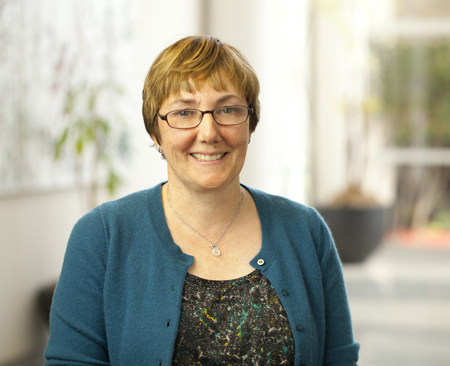Janice Bell:
Seeing beyond the person to improve care for populations
 Associate Professor Janice Bell focuses her research on identifying challenges, recognizing patterns and developing systems that improve people’s experiences and outcomes of care.
Associate Professor Janice Bell focuses her research on identifying challenges, recognizing patterns and developing systems that improve people’s experiences and outcomes of care.
While attending high school in Ontario, Canada, Janice Bell spent weekends working in a nursing home. The admiration she developed for nurses there, coupled with her love of research, propelled her to a career in nursing. Her quest to change the way nurses think about health beyond caring for individuals to caring for populations brought her to the Betty Irene Moore School of Nursing at UC Davis.
“I’m an analytic thinker and research appeals to that side of my brain,” explained Bell, an associate professor at the School of Nursing. “When I worked for a local public health department in maternal child health, I grew interested in the social determinants of health — and questions of how context shapes health and whether health services make a difference.”
Bell witnessed how income inequality influenced pregnancy outcomes during her tenure at Yale-New Haven Hospital in New Haven, Connecticut. Believing health care providers cannot improve population health by focusing on individual behavior one person at a time, she concurrently embarked upon two master’s degrees ― one in public health and the other in community health nursing ― followed by a Doctor of Philosophy in Health Services Research. Her New Haven experience shaped her desire to focus her research on vulnerable populations and reducing health disparities, a cornerstone of the School of Nursing.
“You can’t ask people to change health behavior if there are no structures or systems in place to help them change,” Bell said. “In every health problem there are disparities and there are always some groups not doing as well as others.”
Bell’s current research centers on identifying challenges, recognizing patterns and developing systems that improve people’s experiences and outcomes of care. From evaluating a care-navigator program in Alameda County for African-Americans coping with advanced illness to testing how technology might improve the chemotherapy experience, Bell focuses on health promotion to minimize disparities. In each project, she brings her nursing perspective of caring for people with complex conditions.
“We have emerging areas of focus in the school related to care coordination and chronic disease management that we are only starting to develop,” Bell said. “We have great potential here to contribute meaningfully to research in these areas given the collective expertise of our faculty. Collaborating in groups on these topics could be a win-win for everybody.”
Bell wins outside of the classroom as well. In 2007, she stepped onto a lawn-bowling green near her home in Seattle. The sport of lawn bowls combines the mental prowess of chess, the teamwork of curling and the physical requirements of bowling. Three-and-a-half years later, she was selected for the Bowls USA national team.
“The first minute I stepped on the green, I knew I loved it,” Bell laughed. “When I do things, I generally tend to go overboard. I practice a lot and am very committed.”
In November 2015, the Team USA women won silver at the Asia Pacific Championships and qualified for the 2016 World Bowls Championships, conducted every four years—this year in Christchurch, New Zealand. In the meantime, Bell hopes to spark a commitment to research in students pursuing master’s and doctoral degrees in Nursing Science and Health-Care Leadership. Her students appreciate that commitment so much, six of them successfully nominated Bell for the 2015 Dean’s Excellence in Mentoring Award at Early to Mid-Career Level.
“I strive to integrate my passion for research into my teaching,” Bell said. “When I can tell that a student really understands and gets excited about research, that’s the best.”





